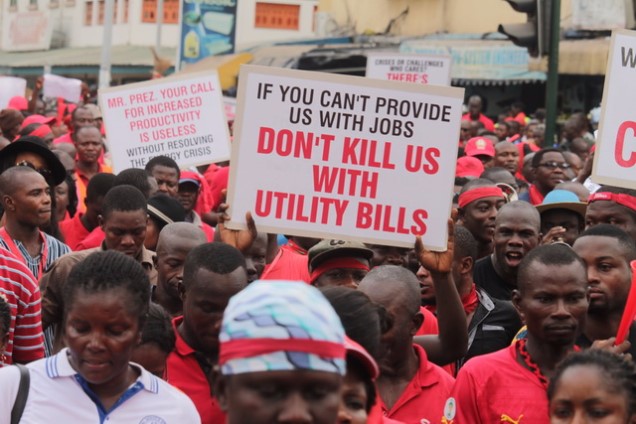Dr. Priscilla Twumasi-Baffour, a Labor Expert and Senior Lecturer at the Department of Economics, University of Ghana, has urged the government to meet the demands of labor halfway.
According to her, the government needs to re-negotiate with labor since the current inflation rate reduces the real wage of public workers significantly.
“…Labor is also concerned about the real wage it takes home. If you look at the inflation rate and the rise in the base pay, then clearly, you find that its next to nothing in terms of increase in the real wage. So, in that instance, I believe that government needs to come to the table and meet labor halfway”.
Dr. Twumasi-Baffour
Her comments come after recent agitations of organized labor following the increment in the base pay by 4% this year. However, according to Organized labor, the wage increment does not commensurate with the high cost of living in the country.
This notwithstanding, Dr. Twumasi-Baffour noted that the government is also concerned about the fact that the economy is on a gradual recovery. As such, any substantial increase in the base pay will have a major toll on government’s resources. According to her, that informed the decision of the government to increase the base pay by 4%.
Mistrust in the negotiations
Speaking on the recent labor unrest, the Senior Lecturer told the Vaultz News that, even though the tripartite committee meets to discuss the wage increments, the negotiations are often marked with mistrust. This is because the government, with its regulatory agencies that are supposed to regulate the environment, is also an employer.
“So, in that instance, we find that a lot of mistrust breed over there. Labor will lay their cards on the table, government will indicate whether it can afford or not”.
Dr. Twumasi-Baffour
According to her, organized labor’s mistrust of the government is further heightened by their perceived huge disparities in the pay structure. This is because labor feels some groups of workers are being heftily remunerated. To Labor, this runs counter to the government’s claims that its finances are weak considering the economy is going through hard times.
“…That mistrust is also reinforced. In that sense, what is good for the goose is good for the gander”.
Dr. Twumasi-Baffour
Effect on cost of production
Even though the Labor Expert urges the government to consider re-negotiating the wages with organized labor, she expects that to be done with care. According to her, wages have a greater role to play in the competitiveness of business in the sub-region.
“But you know, we also need to keep an eye on the cost of labor and the effect it has on the cost of production; especially as we have begun the Africa Continental Free Trade Area (AfCFTA). We see that, yes, companies ought to be competitive and in being competitive, it means that we should be able to produce at a lower cost and cost of labor is critical in that determination”.
Dr. Twumasi-Baffour
Furthermore, Dr. Twumasi-Baffour reiterated that the negotiators should look at the impact on the economy in general before finalizing their agreements. This also means that the long-term effect of the wage increment on job creation must be considered.

On Wednesday, August 18, 2021, Aggrieved Public Sector Workers took to the streets of Accra to protest the inadequacy of the recent 4% increment in their base pay. According to the group, the increment was unfair and would not mitigate the current high cost of living in the country. It therefore, expects at least a 25% increase in the base pay of public sector workers.
Meanwhile, the government expects the 4% increment in the base pay to increase compensation for employees by GH¢1,177 million by the end of 2021. However, if the government considers a re-negotiation, then it will go contrary to its fiscal consolidation efforts. That said, the government currently finds itself between the devil and the deep blue sea.
READ ALSO: Real wage for public sector workers has started declining- Dr Baah




















